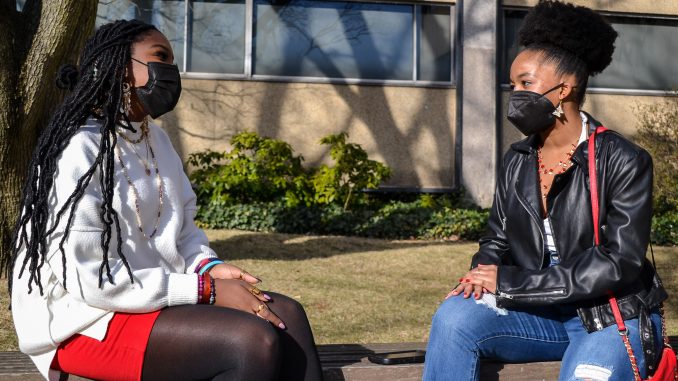
Wearing masks makes it difficult for people to read others’ emotions, especially happiness, which can negatively impact social interactions and customer service, found two joint studies from the Fox School of Business’ Center for Applied Research in Decision Making and Ipsos, a French market research company, according to a Jan. 28 press release.
The studies were conducted in October 2020 and March 2021. Participants were asked to identify the emotions on a range of faces and gave less accurate responses for every emotion except anger when judging masked faces in comparison to unmasked faces.
Masking helps mitigate the spread of COVID-19 because it acts as a barrier between exhaling or inhaling viral droplets, according to the Centers for Disease Control and Prevention.
Widespread mask-wearing, including nonmedical masks, reduces community spread, according to a 2021 study from the Proceedings of the National Academy of Sciences of the United States of America.
However, masks hide portions of people’s faces creating trade-offs in educational settings, said Joshua Klugman, a psychology and sociology professor.
For example, language instructors teach students how to pronounce and enunciate words by mimicking the way they shape their lips as the air passes through them, Klugman said. When wearing masks, students can’t see the lower central portion of the instructor’s face, which makes it difficult to mimic them.
“I’m sure socializing will get better,” Klugman said. “The joy, people’s happiness, their social experiences, will increase when the mandates come off, but also when the threat of COVID has diminished.”
The consequences of masking for adults in the workplace are most likely less dire than for children at school, due to differences in neurological development, Klugman said.
Businesses from the sales, hospitality and service industries had asked Ipsos to study masking’s impact on customer service since the beginning of the pandemic because they were worried about their customers’ experiences, like the emotional connection between the customer and employee that would be stifled when wearing masks, said Jean-Francois Damais, Ipsos’ global chief research officer.
Fox and Ipsos collaborated on this study because Vinod Venkatraman, a marketing professor at Fox and the director of CARD, took a research sabbatical at Ipsos’ headquarters in Paris from 2019 to early 2020. While visiting New York, Venkatraman worked with Ipsos to study the ways tracking private citizens’ biometric data could help companies shape customers’ behavior.
“We had always been interested in human behavior and communication,” Venkatraman said.
To conduct the studies, researchers emailed a random representative sample of the US population, controlling for demographics such as age, race and place of origin. Researchers then directed volunteers to an online survey, where they viewed images of different faces and deciphered their emotions, Venkatraman said.
Participants were first presented with images of full facial features without masks. Volunteers then saw the top half of the face, with the bottom part masked and the bottom half of the face with the top part masked.
They were then presented with images of a smile or a frown to see how well the participants could decipher the emotions when the mask was covering half of the face. Researchers then asked volunteers to rate how well they could discern each facial expression with the mask placed on the top or bottom of the face.
For the second study, Ipsos acquired new participants and showed them a different group of faces, comparing those results to the results from the October tests.
Going forward, Damais wants to study the pandemic’s impact on people during transitional periods, like from adolescence to adulthood. He’d also like to investigate the differences in how the pandemic has shaped an adolescent’s brain versus an adult’s brain.
“It would be interesting to see whether there was particularly an impact amongst the generations that have grown from a very early age through the pandemic,” Damais said.
Correction: A previous version of this story misreported where Vinod Venkatraman worked with Ipsos to study the ways tracking private citizens’ biometric data could help companies shape customers’ behavior. It has been corrected.
Correction: A previous version of this story misreported how researchers directed volunteers to view images of different faces and decipher their emotions. It has been corrected.


Be the first to comment